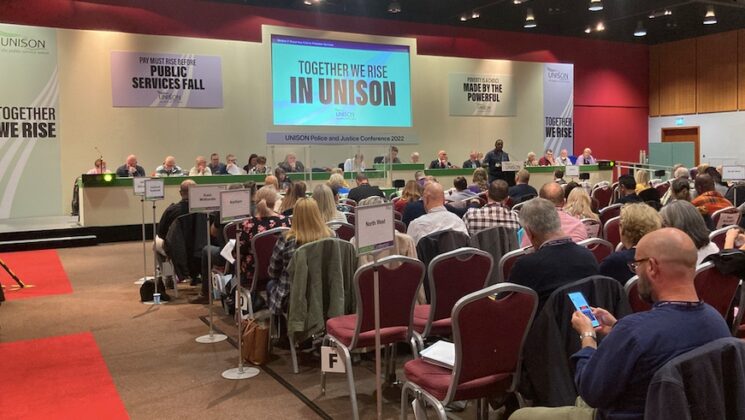Hundreds of delegates gathered in Telford today for UNISON’s police and justice service group conference, in order to decide the union’s priorities for over 50,000 members working in the sector across the England, Scotland and Wales.
UNISON represents people working in policing and probation, from call handlers and community support officers probation officers, custody assistants, cleaners and canteen staff, with 60% of police staff being women.
Chaired by UNISON vice president Libby Nolan, the first day of the conference passed several motions relating to pay and the cost of living.
Cost of living crisis
One delegate, speaking in support of a motion on pay claims and mileage allowances said: “A member approached me last week to say she was making difficult decisions on whether to attend medical appointments, because she couldn’t afford the fuel costs to get to work and get to her appointments.
“My office is set up with a clothing rail for members of staff to donate clothes to others, and it’s so popular that we’ve extended it to children’s clothing too. Our force is now allocating a specific room for this.”
Speaking in support of the motion on behalf of the service group executive, Annie Powell asked delegates: “Can policing and probation maintain the staff they need to provide valuable public services?”
Cuts to the probation service
One of the most passionate motions of the day focused on UNISON’s efforts to prevent any further cuts to probation services.
Introducing the motion, Frank Radcliffe from Eastern region, said: “If they cut any more of the probation services, we’ll bleed to death. We know that Tory tactics are all about shrinking the state, and giving services to private contractors.
“We’ve seen the effect on our communities: it damages staff morale, creates more victims of crime, creates more serious offences and fails to address the vicious cycle of reoffending.”
The probation service has undergone drastic cuts and chaotic restructuring in the past decade, driven by Chris Grayling’s failed ‘transforming rehabilitation’ agenda, which sought to outsource medium and low-risk probation cases to privatised community rehabilitation centres (CRCs), leaving the government-run National Probation Service (NPS) responsible for high-risk cases.
In June 2021, all services were returned in-house to the government.
Vice-chair of UNISON national probation committee Elisa Vasquez-Walters referenced a recent HMPPS report on probation services in London, which marked several areas of London’s probation services as inadequate.
“They are in no way doing inadequate work. Many probation offices are down 50% on staff, and that sort of job cannot be done on those numbers. I do not believe that probation is in any way protected with the government we have now.”
Another delegate noted: “The probation service cannot effectively recruit staff. Those it does recruit, it struggles to retain. Many leave within the first year or two of service.
“I spoke to someone recently who said the most experienced member of staff in their office had five years service. In my region, every probation unit is working in red or amber – bare minimum offender contact, very little rehabilitation work is happening, it’s simply risk management.”
Another delegate added: “People leave because it’s not what they signed up for. People came to the service because they want to help people and rehabilitate people, but all they’re getting now is target after target, and more and more paperwork”.
Challenging sexism, harassment and misogyny
The most emotive speeches of the morning centred on a motion for the union to actively challenge sexism, harassment and misogyny in the police.
One delegate described how she had raised two complaints about police officers for sexual harassment and misogyny in and out of work. “Why didn’t I report it sooner?” she asked. “Because of the culture inside the police, and the stress and the terror involved in putting my head above the parapet to do the right thing – not the easy thing.”
Joanne Moorcroft from Cheshire police branch and the North West women’s committee said that tackling sexism and misogyny will have a positive impact on tackling domestic abuse within the police force.
She told conference: “There is a constant trickle of disrespect, belittlement and harassment. Misogyny is the norm, where men believe they have the right to have power over women, and treat them as lesser beings.
“Every day, women are subjected to sexist harassment in the workplace and told to pass it off as banter. I believe our workplaces know that sexism and misogyny know it’s an important issue to address, but there’s a culture of ‘it doesn’t happen here'”.
Mark Trask, who introduced the motion on behalf of the service group executive, said: “The terms used over and over are “bravery and confidence”, we need to get to a place where we don’t need to be brave to call out this behaviour. I’d like everyone here to make a pledge to do something about it. Let’s be the agents of change to make this change.”
Other motions passed included:
- a demand to lobby for parity between PCSOs and officers’ rates for uniform laundry allowances;
- a demand to mandate ethnicity pay gap reporting among police forces;
- reinforcing the social model of disability within policing and trans equality in the sector;
- a call to campaign for extra funding to increase the numbers of police community support officers (PCSOs) in England by an additional 7,600 posts to replace those lost since 2010. PCSO numbers have been cut by 45% since 2010.

